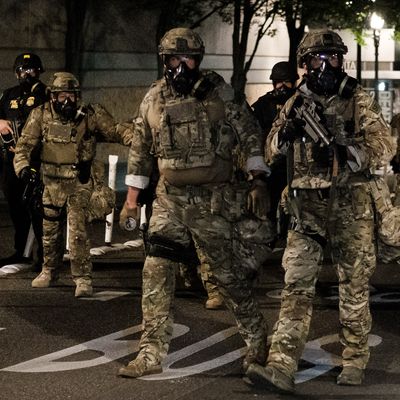
New York Is Committed to Covering This Essential Moment
We’ve removed our paywall from this and other stories about police brutality and systemic racism. Consider becoming a subscriber to support our journalists.
A showdown in policing philosophies is taking place on the streets of Portland, Oregon, where federal agents from the U.S. Department of Homeland Security are working to suppress unrest following the death of George Floyd. In response to President Donald Trump’s directive to federal agencies to step up their efforts to protect federal properties from protesters, rapid-deployment teams of federal agents wearing camouflage uniforms and tactical gear have expanded their efforts from defending a U.S. courthouse to arresting protesters on the streets.
Acting DHS Secretary Chad Wolf, meanwhile, seems to be taking to heart Trump’s desire to “dominate” protesters. Wolf’s Twitter account includes multiple photos of him acting the part of operational commander, including a profile picture of him in headphones and aviator sunglasses. One of his recent tweets states, “We will never surrender to violent extremists on my watch.”
On the other side of the spectrum are local authorities, who oppose the heavy-handed response to 50 straight days of protests in the city. Portland mayor Ted Wheeler and Oregon governor Kate Brown have asked the federal agents to leave, accusing them of exacerbating the situation to rally political support for Trump. Oregon attorney general Ellen Rosenblum has filed a lawsuit, alleging that agents violated the law by arresting individuals and pulling them into unmarked vans. She has also started a criminal investigation into an incident that resulted in an injury to a protester near the federal courthouse. Even Trump’s own U.S. Attorney in Oregon, Billy Williams, has called for an investigation into the conduct of federal agents involved in alleged arrests without probable cause.
When I served as U.S. Attorney for the Eastern District of Michigan, working with law enforcement agencies to protect public safety, we always considered not only whether we could engage in certain law enforcement activity, but whether we should.
In this instance, can federal agents intervene in enforcing the law on the streets of Portland despite opposition from local leaders? Probably. If the agents were from agencies that target violent crime, such as the FBI or ATF, there would be no issue regarding arrests for assaulting federal officers with rocks or using fireworks as weapons. But the participating agencies are all part of the Department of Homeland Security, including Customs and Border Protection and Federal Protective Services. FPS has jurisdiction to protect federal property and to make arrests for federal offenses committed there. The other DHS agencies appear to be deployed in support of the FPS mission. Even CBP may arrest individuals who commit crimes on federal property. But reports of federal agents patrolling the streets and picking up protesters who are not committing customs or immigration offenses may reach beyond their jurisdiction. In addition, as the New York Times reported Saturday, an internal DHS memo warned on Thursday that the federal agents operating in Portland did not have the specialized training or equipment to deal with mass demonstrations or riot control.
Even if these DHS agents can arrest protesters, an equally important question is should they. As former DHS assistant secretary Juliette Kayyem has noted, at a time when the department charged with protecting homeland security faces unprecedented threats to public health and the presidential election, “their priorities seem exceptionally misplaced.”
But misplaced priorities is not the worst harm here. In addition to occupying resources that could be used for better purposes, sending federal agents to quell protests causes long-term damage to the ability of these agencies to perform their missions.
The first rule of effective law enforcement is to gain the trust of the community you serve. Former FBI Detroit Special Agent in Charge Andy Arena frequently said that law enforcement officers can never be successful if they are perceived as an occupying army. Law enforcement is a social compact between community and police to protect the peace. Policing agencies derive their power from the consensus of the governed. As a result, the best law enforcement leaders spend countless hours meeting with community stakeholders, understanding their needs and using discretion to decide which arrests serve the best interests of the people. Overly aggressive tactics against certain groups can undermine the trust that is essential to serve effectively. Trust takes years to build and an instant to lose.
Even if the aggressive federal tactics are successful in suppressing violence in Portland, that success comes at a price. In addition to compromising protesters’ First Amendment rights to demonstrate, federal law enforcement is eroding public trust. When agents knock on doors to investigate crimes in the future, how many residents will open up and talk? When agents testify on the witness stand in courtrooms, how many jurors will believe them? Law enforcement relies on tips and leads from witnesses to crime. How many Portland residents will volunteer information to agents who act like authoritarian thugs? Law enforcement agencies lose their legitimacy when they are perceived as acting outside the best interests of the communities they serve. The resulting lack of respect for the law leads to less compliance.
Building trust is an important part of the work of law enforcement. But the federal agents in Portland are engaging in the exact opposite strategy. This political stunt may have some appeal to those who preach law and order, but not to those who practice it.
Barbara McQuade is a former U.S. Attorney in the Eastern District of Michigan. She now teaches at the University of Michigan Law School.





























